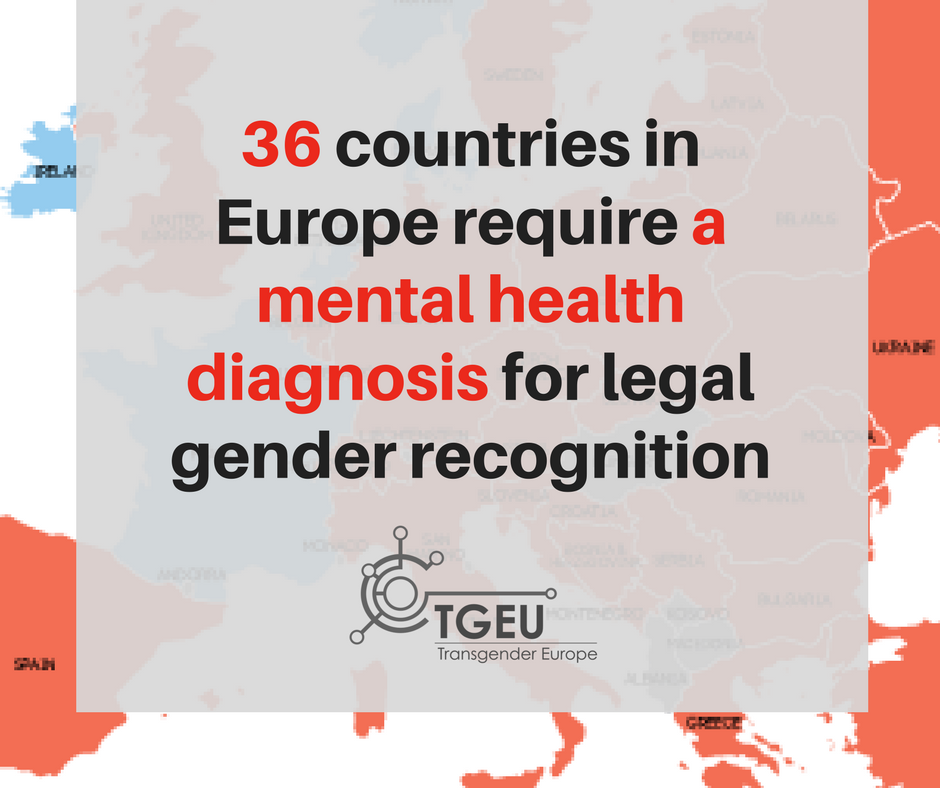The Momentum Is Now! Forced Sterilisation on Its Way Out, but Trans Pathologisation Remains

Today, 19th May, Transgender Europe (TGEU) presented the Trans Rights Europe Map & Index at the IDAHoT Forum in Brussels. The map and index, presented by TGEU’s Executive Director Julia Ehrt, reflects the legal situation for trans rights in Europe, which has been making great strides in the last years.
Forced sterilisation in legal gender recognition is on its way out, but trans people remain subject to mandatory mental health diagnosis.
20 countries in Europe require sterilisation for legal gender recognition
In 2013, when TGEU first published the map, only five countries in Europe had no sterilisation requirement. In just five years we have witnessed this number shoot up to 21 countries not requesting a person to give up their physical integrity. There is a clear trend in countries to move toward self-determination in legal gender recognition.
TGEU’s Senior Policy Officer Richard Kohler comments; “Some of the best legal gender recognition laws are coming out of Europe these days. This year will hopefully bring more bold strides realising human rights of trans people. The European Court of Human Rights has just ruled that forced sterility in legal gender recognition violates human rights. We expect policy makers to act speedily and create gender recognition laws respecting human rights.”
36 countries in Europe require a mental health diagnosis for legal gender recognition
Through presenting a map on the Mental Health Diagnosis, TGEU highlights a remaining barrier to full human rights; a forced mental health diagnosis for legal gender recognition is still widespread in Europe. The time is now to stop declaring trans people as mentally ill in medical catalogues, such as the International Classification of Diseases.
TGEU’s Executive Director, Julia Ehrt, said “A mandatory mental health diagnosis for legal gender recognition violates trans people’s human rights and dignity. It promotes stigma, social exclusion, and discrimination. We welcome Tuesday’s statement by United Nations institutions and international human rights experts which puts pressure on medical classifications to do away with branding gender identities as mentally ill.”
On May 16 a group of high-ranking international experts denounced pathologisation of trans and gender diverse people as a root cause of human rights violations against them, and put pressure on medical classifications, such as the International Classification of Diseases, to do away with declaring diverse gender identities as mentally ill.
###
Ends
For more information:
The Trans Rights Europe Map & Index 2017
Statement „Embrace diversity and protect trans and gender diverse children and adolescents“ by the UN Committee on the Rights of the Child (CRC), the UN Committee Against Torture (CAT), Special Rapporteur on extreme poverty and human rights, Special Rapporteur on the right to education, Independent Expert on protection against violence and discrimination based on sexual orientation and gender identity, Special Rapporteur on the right to health; Special Rapporteur on violence against women, its causes and consequences, and the Working Group on the issue of discrimination against women in law and in practice, Inter-American Commission on Human Rights (IACHR), the African Commission on Human and Peoples’ Rights (ACHPR), Chairperson of the Committee for the Prevention of Torture in Africa, and Council of Europe Commissioner for Human Rights.
In April 2017, the European Court of Human Rights ruled that the sterilisation requirement for legal gender recognition is in violation of human rights, and therefore all Council of Europe Member States must bring their legislation and practice into line with this legal principle.
Transgender Europe is a European human rights NGO working for the human rights and equality of all trans people. More Information: www.tgeu.org
Transgender or Trans is an umbrella term for people whose gender identity or expression differs from the sex assigned to them at birth.